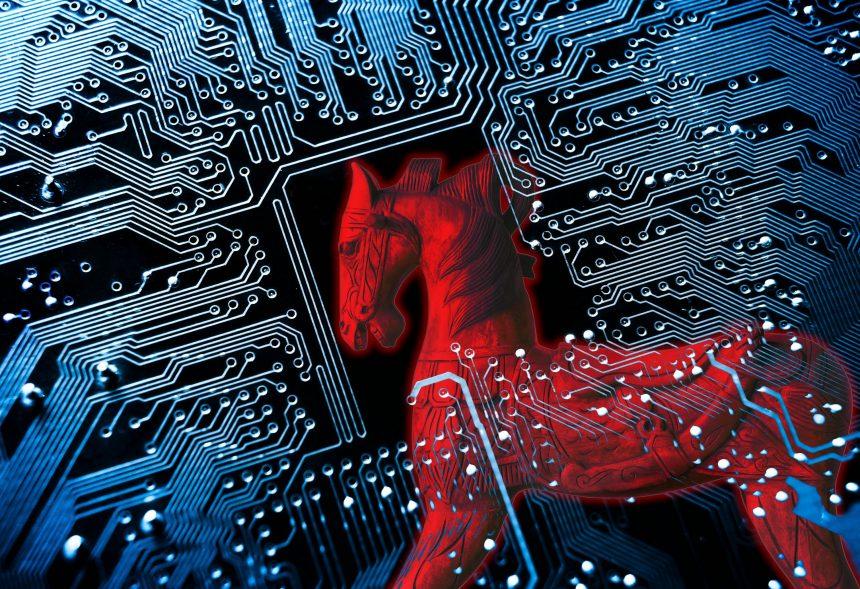Trojan horse malware, commonly referred to as “Trojans,” is a type of malicious software that disguises itself as legitimate or harmless software to deceive users into installing it on their systems. Unlike viruses, Trojans do not replicate; instead, they infiltrate systems through vulnerabilities or by tricking users into downloading them. Once installed, they can cause a range of damage, from data theft to significant system control takeover. These threats pose a substantial risk to both the infected system and the individual behind it, potentially leading to severe privacy breaches, financial loss, and system instability. Trojans are aptly named after the ancient Greek story of the Trojan Horse because they often enter a system undetected, disguised as something trustworthy.
Remove annoying malware threats like this one in seconds!
Scan Your Computer for Free with SpyHunter
Download SpyHunter now, and scan your computer for this and other cybersecurity threats for free!
Overview of Trojan:Win32/KryptInject!pz
Trojan:Win32/KryptInject!pz is a specific and highly dangerous Trojan that infiltrates systems with the intent to gain unauthorized access, steal information, and execute further malicious code. This malware is known for its sophisticated evasion tactics, allowing it to remain undetected by basic security systems while it silently compromises critical system resources. This Trojan often spreads through malicious downloads, email attachments, or drive-by downloads from infected websites. Once installed, KryptInject!pz integrates itself deep within system files, making it challenging to detect and remove manually.
Installation and Actions Performed by KryptInject!pz
Once Trojan:Win32/KryptInject!pz is on the system, it initiates a series of harmful actions aimed at taking control over various system functions. It modifies registry entries and system files to ensure persistence, meaning it can reload every time the system starts. This malware often connects to external servers controlled by attackers, allowing it to download additional payloads, steal sensitive information such as passwords, banking credentials, and personal data, and even record keystrokes. Over time, this Trojan degrades system performance significantly, as it diverts resources to run its processes and connect with remote servers.
Consequences of an Infection
The consequences of having Trojan:Win32/KryptInject!pz on a system are severe. Sensitive data theft can lead to identity fraud, financial losses, and unauthorized access to online accounts. The malware’s presence also opens backdoors for other infections, as its communication with external servers may invite further malicious software onto the device. In extreme cases, it may even allow complete remote access to the infected system, making it possible for attackers to use the system for criminal activities.
Symptoms of an Infection with Trojan:Win32/KryptInject!pz
Detecting Trojan:Win32/KryptInject!pz may not be straightforward, but there are several symptoms users should watch for:
- Unexplained system slowdowns: The system might start lagging or freezing due to resources being hijacked by the malware.
- Increased network activity: An unusual amount of network data usage may be due to the Trojan communicating with its control server.
- Suspicious pop-ups or ads: Trojans can sometimes trigger unwanted pop-ups or redirect the browser to malicious sites.
- Altered system settings: Registry or security settings might be altered, with certain settings locked to prevent removal.
- Unknown processes in Task Manager: Cryptic processes using system resources could be tied to the Trojan.
Detection Names for Trojan:Win32/KryptInject!pz
To help users identify this specific malware, here are some common detection names associated with Trojan:Win32/KryptInject!pz:
- Win32/KryptInject!pz
- Trojan:Win32/KryptInject.A
- Trojan.Injector
- Mal/KryptInject-PZ
- Gen:Variant.Krypt
Similar Threats to Trojan:Win32/KryptInject!pz
Apart from KryptInject!pz, users may encounter other dangerous Trojans with similar functionalities. Some of these include:
- Trojan:Win32/Fuery.A!cl: Known for stealing user data and creating backdoors.
- Trojan:Win32/Necurs.A!bit: Notorious for launching spam campaigns and downloading other malware.
- Trojan:Win32/Emotet: Primarily used to steal banking information and propagate additional malware.
Remove Trojan:Win32/KryptInject!pz
- Start in Safe Mode: Restart your computer and press F8 (or Shift + Restart for Windows 10). Select “Safe Mode with Networking.” Safe Mode limits the malware’s ability to operate as it restricts non-essential programs.
- Delete Temporary Files: Press Win + R, type
%temp%, and delete all temporary files to eliminate any cached malware. - Check for Unusual Programs in the Control Panel:
- Go to Control Panel > Programs > Programs and Features.
- Look for suspicious or unknown software, and uninstall anything suspicious.
- Reset Browser Settings: Often, Trojans impact browsers.
- For Chrome: Go to Settings > Reset and clean up > Restore settings to their original defaults.
- For Firefox: Go to Help > Troubleshooting Information > Refresh Firefox.
- For Edge: Go to Settings > Reset settings > Restore settings to their default values.
- Run a Full Scan with Anti-Malware Software: Use a trusted anti-malware tool like SpyHunter. SpyHunter specializes in detecting and removing Trojans and other malware. Download SpyHunter and perform a full system scan. It will identify and remove Trojan:Win32/KryptInject!pz along with any related threats.
- Check Task Manager for Suspicious Processes:
- Open Task Manager by pressing Ctrl + Shift + Esc.
- Look for any unfamiliar processes consuming high resources, right-click, and select “End Task.” Cross-reference any suspicious process names with online databases to determine if they’re malware-related.
- Remove Suspicious Registry Entries (advanced users):
- Press Win + R, type
regedit, and press Enter to open the Registry Editor. - Carefully navigate to
HKEY_CURRENT_USER\Software\Microsoft\Windows\CurrentVersion\RunandHKEY_LOCAL_MACHINE\Software\Microsoft\Windows\CurrentVersion\Run. - Look for unfamiliar entries and remove them carefully, but only if you are certain they’re related to the Trojan.
- Press Win + R, type
- Reboot the System and Rescan: Restart your computer normally, and perform another scan with SpyHunter to ensure complete removal.
Preventing Future Trojan Infections
To keep your system safe from future Trojan infections, follow these best practices:
- Regularly update software: Ensuring your operating system and software are up-to-date is essential to prevent vulnerabilities.
- Use strong antivirus software: Choose a reputable antivirus solution that actively monitors for Trojans and other malware.
- Avoid unknown downloads: Refrain from downloading files or clicking on links from untrusted sources or emails.
- Enable firewall protection: A firewall adds an additional layer of protection, filtering out malicious traffic.
- Practice safe browsing habits: Stick to trusted websites, especially for financial transactions or personal data entry.
For optimal protection, download SpyHunter and perform regular scans. SpyHunter can detect and prevent a wide range of malware threats, including Trojans like KryptInject!pz, giving you peace of mind and robust system security.





